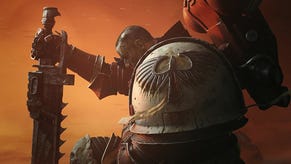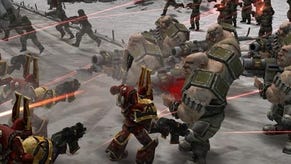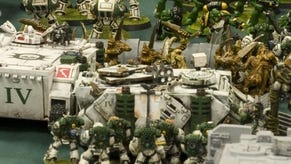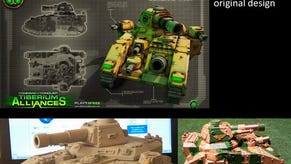Warhammer 40,000: Dawn of War II
Bright new day.
Just down the road, Metrux Ltd sells vans. In the building opposite the Nottingham Textile Group responds with urgency to the great fabric issues of the day. You can only imagine the caustic, and perhaps wistful, glances their employees throw at the network of buildings collectively known as Warhammer World.
Few workplaces have a hulking granite statue of a Space Marine in the car park, and even fewer have a fully operational Dwarven bar. None at all have an echoing hall full of excitable men (some pony-tailed, I'm not going to lie) in surroundings made to look like the ramparts of a fantasy castle.
The day that Eurogamer visits, though, is no ordinary day. According to excitable whispers, someone has rolled 108 dice in one go during a successful Ork charge against a squadron of miniature Space Marines. Less excitingly, it's also the day that Relic has taken up residency to let journalists once again joyously romp around the code of Dawn of War II; each of them racing ahead in the single-player in an attempt to get to the part where the Tyranids enter the fray.
In this aspect, reader, I failed. But I at least came back from this wonderful corner of a Nottingham trading estate with the full knowledge that Dawn of War II is going to emerge in March of next year as a deep and important notch on the bedpost of strategy gaming.
It begins, as is the demand of the Warhammer license, in a gruff and no-nonsense fashion. No need for delicate plotlines, there's only the most fleeting of introductions to your various Space Marine squad commanders and the introduction of yourself (with whatever name you choose; I picked HelloKitty) as an extra-badass Space Marine who's fresh to the fray. The Orks have been stirred into action by an unknown force on the planet Caldarus, so you're off to kill yourself some warbosses.
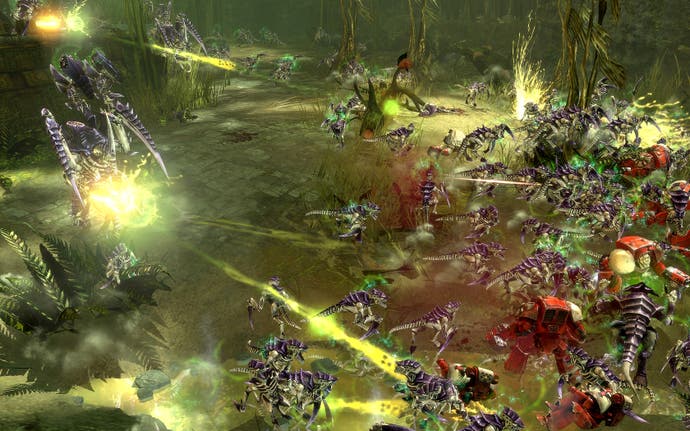
From the outset it's clear that much has changed. Levels are compact affairs, nearly always ending in boss battles. Combat is squad-based, infused with the rough and ready grit of the Company of Heroes series.
Most of all though, the game rewards you with loot like Space Woolies is going bust. Success delivers constant MMO-esque weapon drops and upgrades, efficient combat skill delivers experience points to be tucked into relevant upgrade slots and beefing up your allies in this fashion inevitably leads to even more ability unlocks further on. Dawn of War 2 just doesn't know when to stop giving, and you can't help but love it for that.
Your character is a Force Commander - armed with a chainsword (yes, a chainsaw within a sword) that supplies many varied, beautifully animated and extraordinarily bloody, finishers on the poor Orks, Eldar and Tyranids it connects with. The squads with whom you must co-ordinate an attack, meanwhile, are headed by gravel-tongued Avitus (heavy-gunning), sneaky Cyrus (infiltration/sniping), everyman Tarkus (assault) and valiant Thaddeus (jumping on foes with big stompy metal jet-boots).
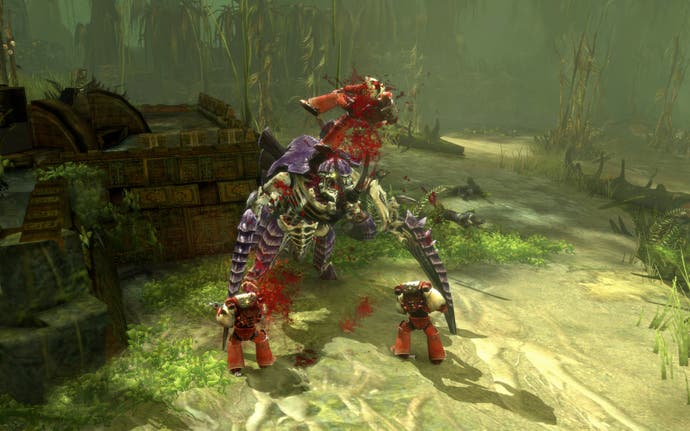
None of these marines can die. They become incapacitated and in need of revival, but the two men accompanying each (both wearing the metaphorical Star Trek red-shirt) are very much attached to this mortal coil. As such, progress through the level revolves around capturing various reinforcement points dotted around.
For example, you could find yourself garrisoning Avitus in a nearby building to supply covering fire, sniping with Cyrus from a conveniently placed ridge and ploughing into the Orkish warhost with your own solitary melee specialist.
Each map you choose to fight on contains optional outposts that you can capture en-route to the mission's final confrontation. So you might unlock the power of orbital strike laser blasts, say, that will no doubt come in useful on your next, tougher, planetary touch-down.
The end result is the story unfolds at its own pace - but the way in which you weave your way along its none-too-complex threads feels relatively non-linear, and certainly provides a taste of freedom.

